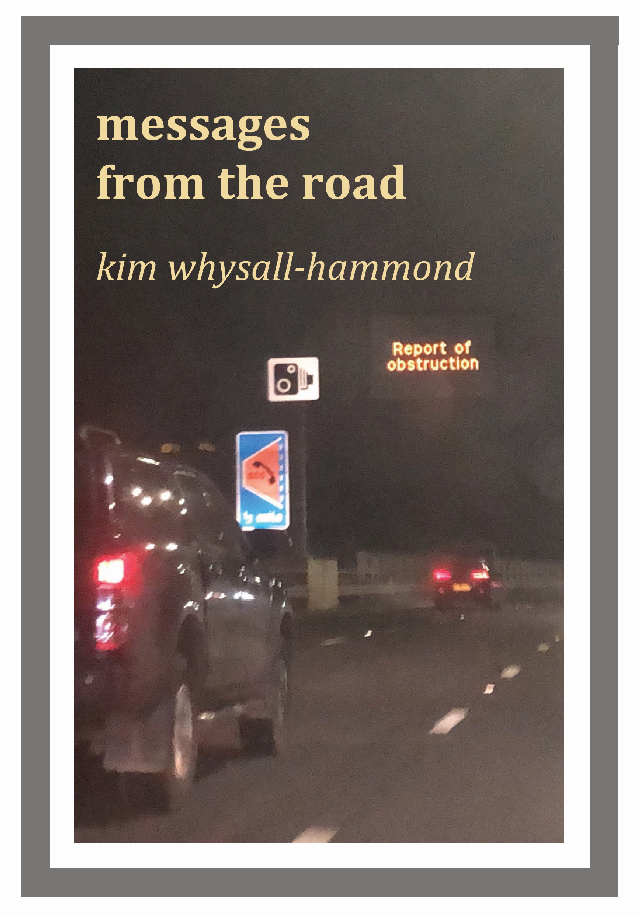
Each poem in Kim Whysall-Hammond's pamphlet collection, Messages from the Road, has a motorway sign as its title. She uses these messages to jump into narratives about love, loss, grief, childhood memories, joy, journeys in all weathers and journeys into the human condition.
Messages from the Road launched online in August 2024 and in Reading in October. You can order a order from this page for £8.50 plus postage.
==========================
Review by Jodie Young on amazon.com.au
Each poem in Kim Whysall-Hammond's Messages from the Road has a motorway sign as its title, which the poet uses as a leaping-off point. As might be expected, there are plenty of journeys throughout the collection and these reflect small and important truths of such travels - restlessness, monotony, fatigue, and often intermingled with emotional undertones from the reason for the journey - telling of illnesses (and death) of loved ones; the displacement of refugees; journeys remembered, present, and foretelling. These are mostly short pieces of reflection or reaction, often dropping into a moment and distilling the experience into quiet revelation or awareness.
Two things stand out for me throughout the book. The first is the juxtaposition of the natural world with the man-made world of imposed order: the roads and directive signs that are yet unable to constrain the chaos of living. Sometimes this appearance of nature is reflective of the poem-speaker's situation, at other times a counterpoint and balm, but always a grounding and explicable element. "Bird banter soundtracks our autumns" (from 'Exit Closed'), and indeed, these poems are rich with birdlife and other aural backdrops. Whysall-Hammond paints with sound much as Turner does with light, an imagistic quality that imbues her poems with mood and tone:
"Notes that curl amongst themselves
enter my flooded ears
Singing
he details the hope of sunrise
Drafts out new minted day a cloud heralded dawn
that washes the sky"
(from 'Incident')
She vividly evokes terrains, both urban and natural. The reader is ever mindful of the vagaries of elements and seasons and weather; the effects of climate change reminding us that "An unflinching eye and heart is needed" if we are to "make a better future" (Wide Load Straddling Lanes).
The second thing that struck me is that while there are poems that address loneliness and grief, isolation and 'otherness', a running thread throughout the poems is one of togetherness and solidarity. The poem's speakers draw strength from steadfast relationships and a knowingness that we are all bound by common travails - the use of 'we' so often in these poems invite us as participants and signal a way forward in fellowship. There is tenderness amidst the starkness, thus never entirely bleak. These are poems that are clear-eyed about the emotional messiness of what it is to be human, but ultimately hopeful and resilient. There are moments where "joy arises this winter night" (from 'Free Recovery') and of defiance: I choose my own lane / stare them down / steal their air (from 'No Lane Changes').
I very much enjoyed the time I've spent with this book. These are deceptively quiet poems that thrum with a subsurface tension that drive the reader on, and while there is no single narrative the cumulative effect of the pieces leads to a cohesive and satisfying whole; in a sense it's akin to world-building, and Whysall-Hammond is very effective in drawing you into her world. These poems most definitely reward rereading; I found myself uncovering further nuances and shades of meaning on a second read and I will be returning to this collection again.
Contact Information
Camilla Reeve, Senior Editor
© Copyright Palewell Press Ltd 2024
Registered in England. Number 10473109. Registered Office 89 Sheen Lane, London SW14 8AE
